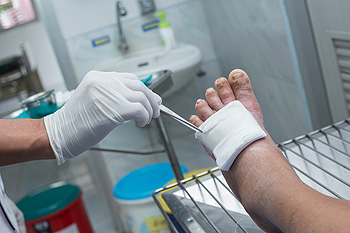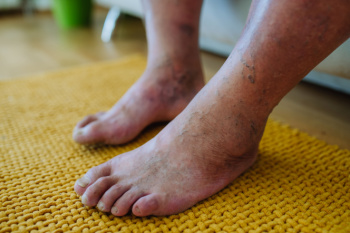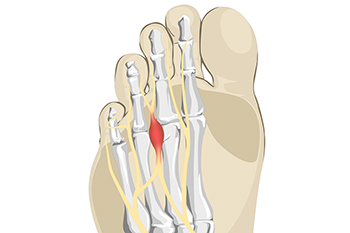Items filtered by date: August 2024
Effective Treatment for Diabetic Foot Wounds

Treating a diabetic foot wound requires careful medical attention to prevent complications and promote healing. A podiatrist starts by cleaning the wound gently with mild soap and water to remove any debris. An antibiotic ointment can then be applied to prevent infection and covered with a sterile bandage. It is important to regularly inspect the wound for signs of infection, such as increased redness or swelling. Managing blood sugar levels is essential, as high glucose can hinder the healing process. Additionally, protect the wound from pressure and friction by using appropriate footwear. Elevating the foot and keeping it dry can also aid in healing. If the wound shows signs of infection or does not improve, seek medical attention promptly from a podiatrist. If you have diabetes and have developed a foot wound, it is strongly suggested that you are under the care of this type of doctor who can treat the wound, and help you to manage this condition.
Wound care is an important part in dealing with diabetes. If you have diabetes and a foot wound or would like more information about wound care for diabetics, consult with one of our podiatrists from Foot and Ankle Reconstruction of Georgia. Our doctors will assess your condition and provide you with quality foot and ankle treatment.
What Is Wound Care?
Wound care is the practice of taking proper care of a wound. This can range from the smallest to the largest of wounds. While everyone can benefit from proper wound care, it is much more important for diabetics. Diabetics often suffer from poor blood circulation which causes wounds to heal much slower than they would in a non-diabetic.
What Is the Importance of Wound Care?
While it may not seem apparent with small ulcers on the foot, for diabetics, any size ulcer can become infected. Diabetics often also suffer from neuropathy, or nerve loss. This means they might not even feel when they have an ulcer on their foot. If the wound becomes severely infected, amputation may be necessary. Therefore, it is of the upmost importance to properly care for any and all foot wounds.
How to Care for Wounds
The best way to care for foot wounds is to prevent them. For diabetics, this means daily inspections of the feet for any signs of abnormalities or ulcers. It is also recommended to see a podiatrist several times a year for a foot inspection. If you do have an ulcer, run the wound under water to clear dirt from the wound; then apply antibiotic ointment to the wound and cover with a bandage. Bandages should be changed daily and keeping pressure off the wound is smart. It is advised to see a podiatrist, who can keep an eye on it.
If you have any questions, please feel free to contact our offices located in Woodstock, Jasper, and Marietta, GA . We offer the newest diagnostic and treatment technologies for all your foot care needs.
How Diabetes Can Affect Feet

Diabetes can significantly impact foot health due to reduced blood circulation and nerve damage, which is known as neuropathy. Poor circulation hampers the delivery of oxygen and nutrients, slowing wound healing and increasing infection risk. Neuropathy diminishes sensation, making it difficult to detect injuries or pressure points, leading to untreated wounds. Proper foot care is essential for individuals with diabetes. Daily inspections for cuts, blisters, or swelling, keeping feet clean and moisturized, and wearing properly fitting shoes are key steps. If you have diabetes, it is suggested that you schedule regular visits to a podiatrist who can monitor foot health, treat issues early, and provide guidance on preventive care.
Diabetic foot care is important in preventing foot ailments such as ulcers. If you are suffering from diabetes or have any other concerns about your feet, contact one of our podiatrists from Foot and Ankle Reconstruction of Georgia. Our doctors can provide the care you need to keep you pain-free and on your feet.
Diabetic Foot Care
Diabetes affects millions of people every year. The condition can damage blood vessels in many parts of the body, especially the feet. Because of this, taking care of your feet is essential if you have diabetes, and having a podiatrist help monitor your foot health is highly recommended.
The Importance of Caring for Your Feet
- Routinely inspect your feet for bruises or sores.
- Wear socks that fit your feet comfortably.
- Wear comfortable shoes that provide adequate support.
Patients with diabetes should have their doctor monitor their blood levels, as blood sugar levels play such a huge role in diabetic care. Monitoring these levels on a regular basis is highly advised.
It is always best to inform your healthcare professional of any concerns you may have regarding your feet, especially for diabetic patients. Early treatment and routine foot examinations are keys to maintaining proper health, especially because severe complications can arise if proper treatment is not applied.
If you have any questions please feel free to contact our offices located in Woodstock, Jasper, and Marietta, GA . We offer the newest diagnostic and treatment technologies for all your foot and ankle needs.
What Is Morton’s Neuroma?

One common cause of foot pain is Morton’s neuroma, a thickening of the nerve tissue between the toes. This condition usually affects the space between the third and fourth toes, causing symptoms such as burning pain, tingling, numbness, and a strange sensation like walking on a pebble. Pain is often worsened by wearing shoes that are too tight or have high heels. Morton’s neuroma can be diagnosed through medical history and physical examination. In some cases, imaging studies may be needed to rule out other causes of foot pain. Treatment often includes resting the foot, wearing orthotics, and taking medications to reduce pain. In many cases, surgical intervention is needed. If you have symptoms of Morton’s neuroma, it is suggested you make an appointment with a podiatrist for care and treatment options.
Morton’s neuroma is a very uncomfortable condition to live with. If you think you have Morton’s neuroma, contact one of our podiatrists of Foot and Ankle Reconstruction of Georgia. Our doctors will attend to all of your foot care needs and answer any of your related questions.
Morton’s Neuroma
Morton's neuroma is a painful foot condition that commonly affects the areas between the second and third or third and fourth toe, although other areas of the foot are also susceptible. Morton’s neuroma is caused by an inflamed nerve in the foot that is being squeezed and aggravated by surrounding bones.
What Increases the Chances of Having Morton’s Neuroma?
- Ill-fitting high heels or shoes that add pressure to the toe or foot
- Jogging, running or any sport that involves constant impact to the foot
- Flat feet, bunions, and any other foot deformities
Morton’s neuroma is a very treatable condition. Orthotics and shoe inserts can often be used to alleviate the pain on the forefront of the feet. In more severe cases, corticosteroids can also be prescribed. In order to figure out the best treatment for your neuroma, it’s recommended to seek the care of a podiatrist who can diagnose your condition and provide different treatment options.
If you have any questions, please feel free to contact our offices located in Woodstock, Jasper, and Marietta, GA . We offer the newest diagnostic and treatment technologies for all your foot care needs.
Causes of Foot and Ankle Injuries While Surfing

Surfing, a thrilling sport, can lead to foot and ankle injuries due to various factors. A common cause is improper technique, such as awkward landings or falls while maneuvering on the board. Another factor is overuse, as repetitive motions can strain muscles and tendons in the feet and ankles. Uneven surfaces and impact with the board or ocean floor can also contribute to injuries like sprains, strains, or even fractures. To prevent these injuries, surfers should focus on building strength and flexibility through targeted exercises for the ankles and feet. Practicing proper surfing techniques and gradually increasing wave difficulty can also reduce the risk of foot injury. Wearing supportive footwear and using ankle braces or taping for added stability are additional measures to protect against twists or strains. If you have sustained a foot or ankle injury while surfing, it is suggested you consult a podiatrist who can offer treatment options.
Ankle and foot injuries are common among athletes and in many sports. They can be caused by several problems and may be potentially serious. If you are feeling pain or think you were injured in a sporting event or when exercising, consult with one of our podiatrists from Foot and Ankle Reconstruction of Georgia. Our doctors will assess your condition and provide you with quality foot and ankle treatment.
Common Injuries
The most common injuries that occur in sporting activities include:
- Achilles Tendonitis
- Achilles Tendon Rupture
- Ankle Sprains
- Broken Foot
- Plantar Fasciitis
- Stress Fractures
- Turf Toe
Symptoms
Symptoms vary depending upon the injury and in some cases, there may be no symptoms at all. However, in most cases, some form of symptom is experienced. Pain, aching, burning, bruising, tenderness, tightness or stiffness, sensation loss, difficulty moving, and swelling are the most common symptoms.
Treatment
Just as symptoms vary depending upon the injury, so do treatment options. A common treatment method is known as the RICE method. This method involves rest, applying ice, compression and elevating the afflicted foot or ankle. If the injury appears to be more serious, surgery might be required, such as arthroscopic or reconstructive surgery. Lastly, rehabilitation or therapy might be needed to gain full functionality in the afflicted area. Any discomfort experienced by an athlete must be evaluated by a licensed, reputable medical professional.
If you have any questions, please feel free to contact our offices located in Woodstock, Jasper, and Marietta, GA . We offer the newest diagnostic and treatment technologies for all your foot care needs.

